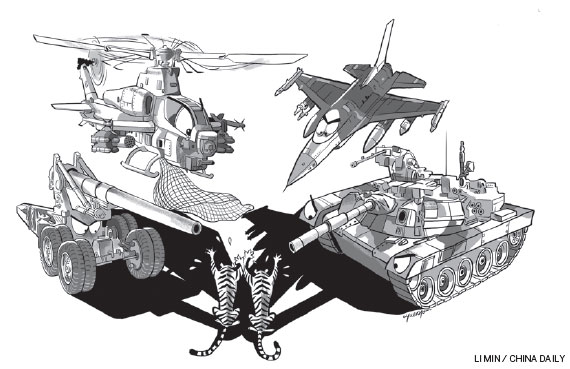Anti-graft battle helps build a strong military
China faces major as well as potentially minor security threats, and given the complicated international situation, the security environment in its neighborhood cannot be said to be satisfactory. This calls for further reform of the military, without which China cannot safeguard its national security.
The reform of China's military is also necessary to keep pace with the military buildup across the world and to eradicate the force of bad elements, especially senior officers, that have indulged in corruption and pomposity and thus lowered the morale of patriots.
An armed force's main responsibility is to safeguard a country's national security and defend its territorial integrity against attacks. With such a perception in mind, China's leadership headed by President Xi Jinping has accorded the highest priority to military reforms. The reforms are also expected to improve national governance.
The severe crackdown on corrupt military officers, including Xu Caihou, former vice-chairman of the Central Military Commission, and Gu Junshan, former deputy head of the People's Liberation Army General Logistics Department, shows the top leadership's determination to root out corruption from the military.
But the ever-intensifying anti-corruption campaign, which has netted "tigers" (corrupt high-ranking officials) as well as "flies" (lower-raking officials), has prompted some people to ask whether the campaign would affect the fighting spirit of the military.
Such people should be informed that the investigations against corrupt military officers will not dent the fighting capability or spirit of the military, or spoil its image. If anything, the anti-corruption drive will further strengthen the PLA.
Corruption can debilitate a military. For instance, corruption in appointment of personnel will deprive qualified and capable officers of promotion, impairing the force and demoralizing the personnel. This will weaken management, and affect the training and fighting ability of the military personnel. Also, corruption will lead to extravagance and waste of limited strategic resources that could otherwise be used for strengthening the military.
China's ongoing battle against corruption in the military also shows how determined and capable it is when it comes to self-improvement. There is enough reason to believe that, as one after another corrupt military officer falls, the modernization of China's military will gain pace and the country will once again have a clean, valiant and mighty fighting force.
The top leader Xi recently said that for income, military personnel, including officers, should only depend on their salaries. Only after this becomes a reality can China have a clean, efficient and powerful military.
But since the salaries of China's military personnel and officers are less than what their counterparts in developed countries get, the country has to increase their pay. Before announcing the pay rise, the country's leadership should make the facts clear to the rest of the world so that detractors don't accuse China of a military buildup.
The military cannot be exempt from the anti-corruption campaign simply because it is part of the State. Xi's recent remarks that "no upper limits are set for the anti-corruption drive in the military" and "any one, no matter how senior he or she is, could be investigated and penalized" reflect the top leadership's resolve to develop a military that will serve as the cornerstone of national security and development, and help realize the Chinese Dream.
The author is a professor at and presiding director of the Strategy and Security Institute, affiliated to the PLA University of International Studies.



















